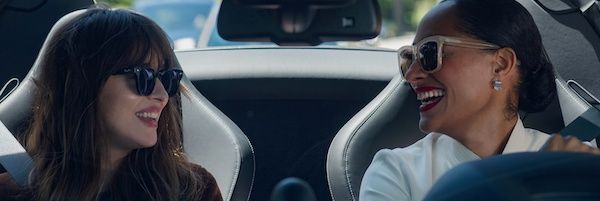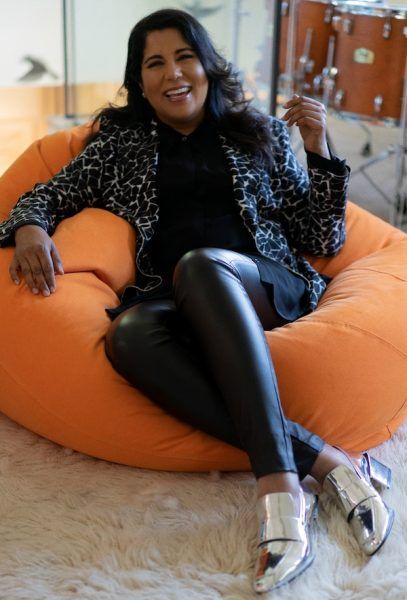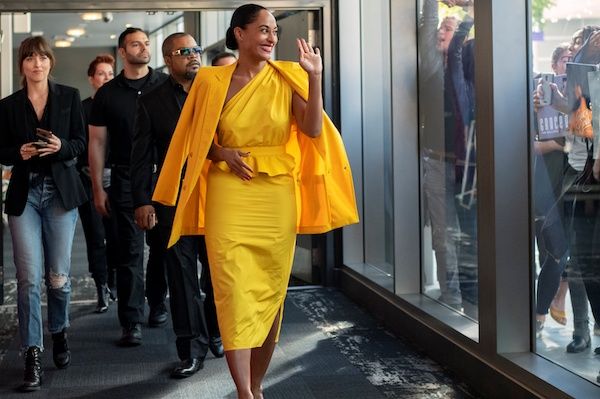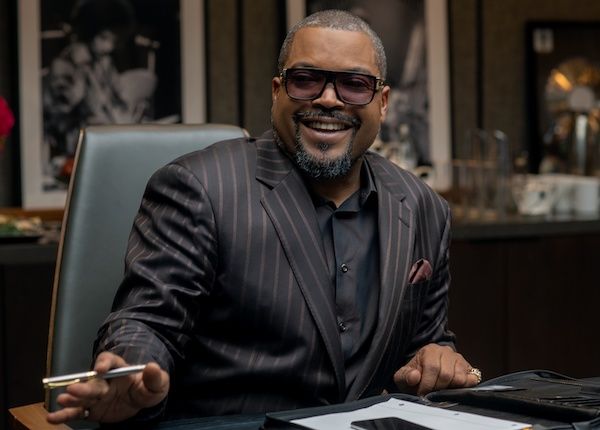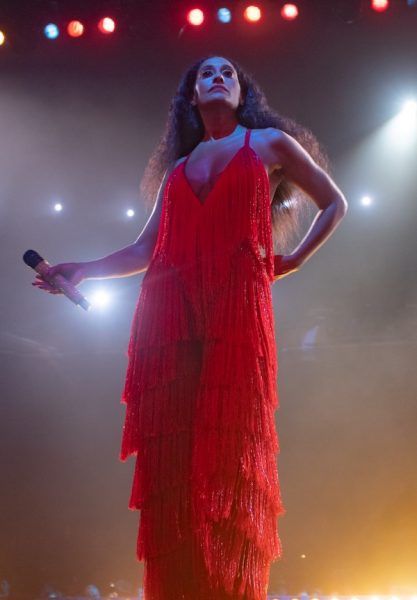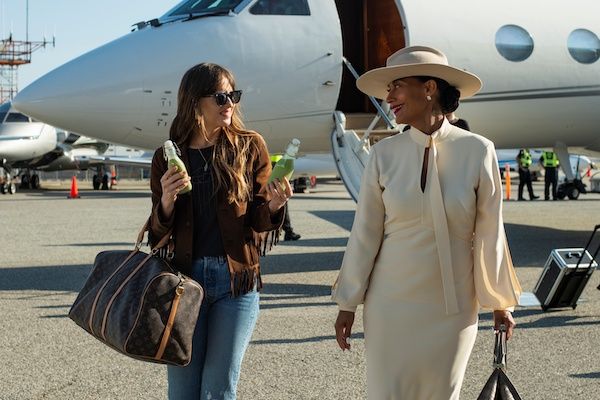From director Nisha Ganatra (Late Night) and screenwriter Flora Greeson, the romantic dramedy The High Note tells the story of music superstar Grace Davis (Tracee Ellis Ross), a phenomenally talented singer who has reached unbelievable heights in her career, only to now be stifled by the safe bets that her long-time manager (Ice Cube) and record label are pushing for her to focus on. Secretly wondering if she should take a chance and record new music, Grace has to decide whether to follow her heart or the advice that she’s being given, all while her overworked personal assistant Maggie (Dakota Johnson) just wants Grace to give her a chance at her dream of becoming a music producer.
During this 1-on-1 phone interview with Collider, Ganatra discusses the themes which drew her to both The High Note and Late Night, the changes from the original script, being very aware of race and the way it functions in certain dynamics in the film, what it was like to be the one responsible for debuting Ross’ singing voice to the world, how the ending of the film came about, deleted scenes, and much more.
COLLIDER: I loved The High Note, and I loved Late Night. When you read the script for Late Night, did you immediately know it was a story you wanted to and could tell? When you read the script for The High Note, did it give you that same feeling, or was it an even stronger feeling after having already done Late Night?
NISHA GANATRA: It’s funny. I know they’re weirdly similar, in terms of a really ambitious woman and an outsider wanting to break in. I relate to that story of the outsider wanting to break in. But this one was interesting because Maggie wasn’t as much of an outsider as Mindy [Kaling’s] character [in Late Night]. She already has the job and is just trying to pursue another dream — which is what she got the job for — her ultimate pursuit of being a producer. For me, it’s really fun to watch women who are dedicated to their careers, and really good at what they do, and are unapologetic for being good at what they do. They’re not bumbling or fumbling, or screwed up in other areas, or apologizing, or dimming the lights so people are more comfortable with their competence. That, to me, is really a fun thing to embrace.
These women are really good at what they do, they really want to do more, and they’re just not getting the opportunity. They reach a point where they’re either gonna take a big risk and lose everything, or be really rewarded for it. I think both movies really reward women for taking big risks, and that’s something I’m always behind. I always want to be like, “You do it. You follow your dream and everything is gonna work out great. You’re gonna have to bust your ass and work really hard, but then you’re going to get your dream.”
Obviously, every film is made with the goal of getting it out into theaters and on big screens and in front of audiences, and then the world, as we know it, changed. What has that been like to deal with?
GANATRA: It was a huge bummer, just because I love going to the movie theater and watching movies with large groups of people. Even though I live in the world and accept more people see movies at home (and I get it), it’s that communal experience, especially with a comedy and hearing other people laugh. One of my favorite moments is finding out, “Did this joke play? Did it not? Are people loving this as much as I am?” It’s really sad to not be able to experience that, right now. Hopefully, we’ll be able to experience it not too far from now. But given the state of the world, it feels like the only responsible thing to do is not ask people to risk their health to see a movie right now, but to enjoy it. Because it is one of those big, fun studio films that make you feel good and hopeful, and like the world is generally a good place that wants good things to happen, it’s a nice movie to watch, right now. Everything can sometimes feel like it’s catching fire, left and right, so it’s nice to watch something that assures you that there is goodness in the world.
Were there any major changes to the story or any of the characters, from that original script that you read?
GANATRA: I wouldn’t say there were major changes. One big change was Ice Cube playing the part of the manager, which is amazing. When Ice Cube comes in, you’ve gotta just embrace all of the comedy gold that he gives you. So, I’d say his character probably changed the most.
But it was really well written. I loved Flora [Greeson]’s writing. I loved her script. She’s really a thoughtful writer. She was very aware of the race dynamic between a white woman and a black woman, and not having a white savior movie and not, in any way, making it so that the career of Grace or [Kelvin Harrison Jr.'s character] David rested on Maggie in any way. Also, she made sure Maggie’s character had her own arc and growth and storyline. I thought it was handled in such a great way for the tone of this movie. That bathroom scene, where the confrontation happens, is arguably the most important scene in the movie and I think it’s so beautifully done in the way Tracee [Ellis Ross]’s character just calls out white privilege. Maggie’s been bouncing through the movie, and then gets called to task for that. It’s really interesting to me; here’s this icon who’s never had the access this assistant has, simply because she’s black and everyone else is white. It's something we were balancing and thinking about consciously through the entire movie, but it was one of the rare scenes where it’s voiced.
I can’t imagine anyone ever thought Ice Cube and Diplo would be in a room together. What was it like to direct to them together? Could you have ever imagined putting that on your resume?
GANATRA: No, I could not. Every day I saw Ice Cube, I was just fanning out and freaking out that Ice Cube was there because I’ve loved him for so long. Diplo and Ice Cube, in that scene together, was a nightmare because they are both so funny, and all you’re trying to do is make sure you capture every hilarious thing that comes out of their mouths. You can’t because you eventually have to stop shooting, and you have to move through the day and shoot other things in the movie, when all you really wanna do is just keep listening to those two improv with each other because it gets more and more ridiculous and hilarious.
I really can’t imagine anyone other than Tracee Ellis Ross doing this role. Did you ever consider anyone else? Was it always her?
GANATRA: I felt the same way. I couldn’t imagine anybody else that could do all of that. It was always her. It was just that thing where, who else would have the comedy range to be Grace Davis, the firsthand knowledge of music icons lives to bring in nuance and a layered performance, so that it didn’t just become a one-note diva, and could break your heart with their openness and vulnerability, but also just be so fun to watch. She’s a bit of a diva and a style icon, in real life. She’s larger than life. She just has those big eyes and that really big personality. Who else could be Grace Davis?
What was it like to be the one responsible for getting Tracee Ellis Ross to sing publicly, for the first time, and what most surprised and impressed you about her talent, as a singer?
GANATRA: It’s absolutely terrifying to be the person debuting Tracee Ellis Ross’ voice to the world. More terrifying for her, though, to be the voice that is being debuted to the world. To be the daughter of Diana Ross, with the inevitable comparisons, though they’re not fair. I feel like, if we’re gonna compare Tracee’s singing to Diana Ross’ singing, then we should compare Diana Ross’ comedic acting to Tracee’s comedic acting, as well. But they are a lovely, supportive family, and her mom is so sweet and proud of her. It’s nerve-wracking. I hadn’t heard her sing when I cast her, but once I heard her sing, I was relieved and overjoyed that I could just simply record her. I was also really struck by the unfairness of life. That Tracee gets to be so beautiful, so kind, so smart, and so talented at acting, and then can also sing, is really just not cool.
Tracee Ellis Ross and Dakota Johnson are so great together. How did they end up paired up?
GANATRA: Dakota was actually attached to the script, so I came into it already knowing that Dakota was Maggie. And then, Tracee was just a no-brainer.
I love the moment at the end of the film where Maggie just closes her eyes and relishes being in the position she’s been dreaming of, for so long. It really says so much without saying any words. What made that the right place to end the film?
GANATRA: I think they could have ended it at the concert, but to me, it felt like the love story between Grace and Maggie, and their dynamic, and how they support each other, and are together and break apart and come together again, really needed to land. It’s a pretty tricky movie, in the sense it’s set up as a workplace comedy, and then it shifts into a rom-com, and then you have to land three different storylines – the romance with David, the Maggie-Grace work arc, which is the most compelling, and the mother-son arc – that all have to land within the same three-minute section, and that was really tricky to navigate as a director. I think it’s just would have been unsatisfying, if you didn’t see Maggie and Grace, and what they create together, in the end.
Were there a lot of deleted scenes, or a lot of versions of jokes that you had to decide between?
GANATRA: Yes. I’m hoping we get to put out the deleted scenes, so that you can see all of their funny moments. Marc Evan Jackson was just so funny, in all of his takes. I think we tried to squeeze in every single one of his improvs. June Diane Raphael had a lot of hilarious things that we couldn’t include. It was really fun to watch her.
Have you started to think about what you want to do next and how you’re going to have to approach filmmaking now, with this new world that we’re all living in?
GANATRA: Yes, of course. I think everybody is thinking about that. I’m really excited to see the art that comes from it. I think artists are the most innovative people. Art informs invention, and invention informs art, so I’m really curious and excited about this next little period of time, which is hopefully a little period of time, where we have to be extremely creative, in how we keep making movies and TV. It’s not a fun challenge because it’s horrible what’s happening in the world, but the drive to make art is so compelling to me that it’s going to be creative. How it’s going to be creative is gonna be the most interesting aspect.
The High Note is now available to rent on-demand.

